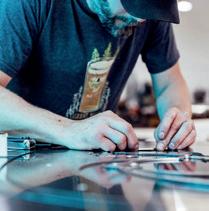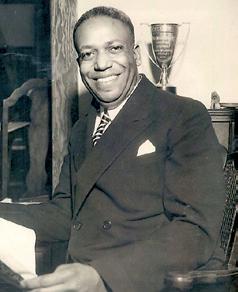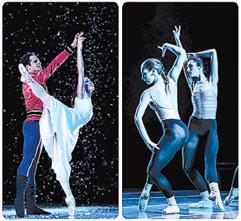
5 minute read
At
by David Pan
10 Star Construction
houses initially offered lodging and a hot meal to weary travelers where dancing and live music was often provided. During the Prohibition era, the remote location of many of these roadhouses encouraged the illegal sale and consumption of alcohol, thus earning them a lot of notoriety.
Advertisement
After the repeal of Prohibition, Washington state law forbade the sale or consumption of hard liquor at any public venue. Local roadhouses side-stepped this by allowing guests to smuggle in their own bottles of liquor, at which point they became colloquially known as “bottle clubs.”
In the local area, most roadhouses were located on either the Bothell Highway (now Bothell Way and Lake City Way), or on Highway 99 from Shoreline and up through Everett.
The story of the Highway 99 roadhouses begins in 1923, when plans were put in place for a more direct route from Seattle to Everett and a new highway was constructed using North Trunk Road – an old wagon road that provided the earliest route leading north out of Seattle.
Work on the new roadway began in 1925 and, on Oct. 26, 1927, the new Pacific Highway (or State Route 99) officially see LOST IN TIME page 15 u u from MORE NEWS BRIEFS page 11
“We are grateful to the Department of Ecology for helping fund this amazing project that will serve our customers for years to come,” said Pam Baley, PUD Assistant General Manager of Customer and Energy Services. “This is one of many steps the PUD has planned to promote cleaner transportation in our community.”
The PUD’s headquarters is adjacent to Interstate-5 and State Route 2, making it a convenient location for travelers heading along these high-use corridors. The building includes public restrooms and meeting spaces, and is within walking distance to many downtown businesses.
“We’re excited to be part of this project to bring more electric vehicle charging infrastructure to our city,” said City of Everett Mayor Cassie Franklin. “Electric vehicles are an important component of our climate action plan and regional goals for clean, healthy air for all.”
Notice to Readers: The Beacon publishes service advertisements from licensed and non-licensed businesses and individuals. You are encouraged, for you protection, to ask to see their business license before hiring. Washington State Construction Contractor Law, RCW of Labor and
(LNI) contractor registration as well as the registration name of firm as registered with LNI contractor registration section. Failure to obtain a registration from LNI or show the contractor registration number in all advertising may result in a fine penalty. For more information, call LNI Specialty Compliance Services division at 800-647-0982 or check the LNI website at www.lni.wa.gov. opened to traffic. Various businesses quickly opened along this new route, including gas stations, restaurants and motels.
Joining these new establishments were the area’s two earliest roadhouses: McKenzie’s Bungalow Inn, which boasted the area’s biggest police raid, in which over 150 people were arrested in a single night; and Doc Hamilton’s Barbecue Ranch.
Others soon followed, and all were eager to fulfill the public demand for liquor, gambling and risqué entertainment.
The roadhouses along State Route 99 had distinct characteristics which set them slightly apart from their Bothell Way counterparts.
“Lost Roadhouses of Seattle”
Authors: Peter Blecha and Brad Holden

Publisher: Arcadia Publishing.
Price: $23.99 by locals as the “Windmill” due to the large rotating windmill that was attached to the front of the building.
Release date: Aug. 15.

The interior of Dutcher’s featured two dance floors and four bars, which quickly earned the place some notoriety.
One of the more notorious of these roadhouses was a “theater supper club” known as Rubenak’s. Located at 18525 Highway 99, Rubenak’s provided its clientele with bawdy entertainment for over two decades.
Many had fancy facades – often built of stucco – that were attractive from the street. However, the buildings themselves were often crudely constructed together with scrap wood.
As a result, most of the Highway 99 roadhouses represented major fire hazards and, in fact, many met their demise by burning to the ground in a spectacular fashion.
Another defining trait was the heavy amount of prostitution. Several of the roadhouses along Highway 99 had “guest cottages” or “traveler inns” conveniently located either next door or across the street, where customers and their new dates could finalize any business transactions.
Throughout the 1920s and ’30s, several roadhouses emerged along the new Everett Highway, including such notable places as Dutcher’s – a local roadside attraction that was 2 miles south of Everett and was known
Al Rubenak had previously used the building to run a restaurant called the Pig, but when Prohibition was repealed in 1933, he reopened as a roadside inn. Rubenak’s offered the typical dining and dancing that was provided by many local clubs, but was perhaps best known for staying open until 4 in the morning.
Their official motto was “Drink to the future and forget the past” and, indeed, the booze flowed freely at this well-known roadhouse.
In the late 1930s, as local residents became more and more fed up with the lawlessness surrounding the inns and roadhouses along Highway 99, an up-and-coming young attorney by the name of Henry Martin Jackson was elected as prosecuting attorney for Snohomish County.
More commonly known by his nickname, “Scoop” Jackson, the young crime fighter had vowed to clean up the liquor, prostitution and gambling that had plagued the area for over a decade.
Jackson wasted no time in cracking down on the roadhouses, personally leading the sheriff and his deputies on weekly raids and making sure that all arrests led to successful prosecutions.
By 1940, he had made quite a name for himself by putting several well-known bootleggers and corrupt club owners behind bars, and would use this legal fame to launch a successful political career, serving the state of Washington as both a U.S. representative and, later, as a U.S. senator.

The effects of Jackson’s war against the roadhouses were felt quickly, and by the time he assumed political office several of the illegal clubs along Highway 99 had been forced to close down.
In this sense, his reign as the local prosecutor served as a symbolic end to the golden era of Highway 99 roadhouses.
Rubenak’s was the site of several of these police raids, and in 1943, Al Rubenak – tired of all the legal hassles associated with the place –sold the joint and retired from the nightclub business for good. The club continued to operate as Rubenak’s, although despite a different ownership, it continued to run afoul of the law and was cited for numerous liquor and gambling violations well into the 1950s.
In 1956, The Seattle Times sent one of its reporters to Rubenak’s and found over 100 customers sitting throughout the place while blackjack, craps, and dice games were being played in different rooms.
Meanwhile, on the stage, music was reportedly provided by a clarinet player and a onearmed drummer, while three “scantily-clad” dancers entertained guests as part of their “girl revue.” When asked for comment, a Seattle police officer quipped, “They sure run things differently in Snohomish County, don’t they?”
By the late 1950s, Rubenak’s followed the course of most other Highway 99 roadhouses and went out of business for good. Today, Eunia Plaza now sits in the former site of the once popular night spot.
OBT will be raising funds with the annual Autumn Auction & Costume Ball, taking place at the Nile Shrine Center in Mountlake Terrace Oct. 29.
Info: For more information about tickets or auction sponsorships: www.bit.ly/3Pli3O7.
OBT is offering season subscriptions and single tickets to each performance.

Tickets are $27-$50 per person and can be purchased online at www.olympicballet. org/tickets.

More info: 425-774-7570, dance@olympicballet.org.







